Sunday 10 PRAYERS FOR THOSE HIT BY DEADLY TYPHOON
During the Angelus with pilgrims in St. Peter’s Square, the Pope expressed his concern and prayers for the estimated tens of thousands of people dead and others affected by Super Typhoon Haiyan, which devastated parts of the central Philippines November 8. “I wish to express my closeness to the people of the Philippines and that region that has been hit by a terrible typhoon,” he said. “Unfortunately the victims are many and the damage is enormous.” He asked the tens of thousands of people gathered in the Square to join him in a moment of silent prayer “for these brothers and sisters.” He added: “Let’s try also to make our concrete help reach them.” In response to the tragedy, Pope Francis made an initial donation of $150,000 for the relief efforts through the Pontifical Council Cor Unum.
CARDINAL BARTOLUCCI PASSES AWAY
Italian Cardinal Domenico Bartolucci, who had devoted most of his priestly life to music and served as director of the Sistine Chapel Choir for more than 40 years, died at the age of 96. Appointed director of the choir by Pope Pius XII in 1956, he reorganized its musical program, formed the Sistine Chapel boys’ choir, took the group on the road to give concerts around the world, and continued composing works for both choir and orchestra. Cardinal Bartolucci had retired from the Sistine Chapel post in 1997, but he continued composing music, including Benedictus, a piece written and performed in 2011 for retired Pope Benedict XVI, who had named him to the College of Cardinals a year earlier.
Wednesday 13 CONFESSION RENEWS GRACE OF BAPTISM
Baptism is “God’s powerful intervention in our lives to save us,” Pope Francis said today at his General Audience. “This saving intervention of God doesn’t remove our human nature and weakness; we are all weak and we are all sinners. And baptism doesn’t remove our responsibility to ask forgiveness every time we err,” the Pope said. At the end of the audience, Pope Francis offered prayers for the victims of the typhoon in the Philippines and for those who died November 11 when a mortar shell hit a school bus in Damascus, Syria. “This must never happen! Let us pray with insistence,” the Pope said. The “real battles” that need to be fought in the world, he said, are not wars for power, but battles “for life, never for death.” In his main audience talk, continuing a Year of Faith series about the Creed, Pope Francis reflected on the affirmation, “I confess one baptism for the forgiveness of sins.”
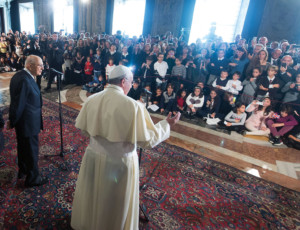
Pope Francis stands with Italy’s President Giorgio Napolitano as he greets staff members and their families during his first state visit to Italy’s Quirinal presidential palace in Rome on November 14 (CNS photo).
Thursday 14 POPE FRANCIS’ FIRST STATE VISIT The Holy Father, traveling two miles from Vatican City to Italy’s presidential palace, met Giorgio Napolitano, the Italian president, and voiced the Church’s solidarity with the nation in facing social challenges that include immigration, unemployment and the well-being of families. The Pope rode to the palace in a dark blue Ford Focus sedan and his motorcade drove through ordinary traffic on the streets of Rome. By contrast, when Pope Benedict XVI made his first state visit to Italy in 2005, he rode in an open-topped Mercedes, flanked by a squad of helmeted Italian military police on horseback. In what the Vatican press office described as an innovation to the protocol for state visits, Pope Francis greeted not only government ministers and other dignitaries but also palace staff members and their families, whom he encouraged to greet visitors to the palace with a “spirit of welcome and understanding.”
Sunday 17 POPE PRESCRIBES “SPIRITUAL MEDICINE” “I want to recommend some medicine for all of you,” the Pope said at the end of his Sunday Angelus address. “It’s a spiritual medicine.” Holding up a white medicine box with an anatomical drawing of the human heart on it, Pope Francis told some 80,000 people gathered for the midday prayer that the boxes contained a rosary. “Don’t forget to take it,” he said. “It’s good for your heart, for your soul, for your whole life.” Volunteers, led by Archbishop Konrad Krajewski, director of papal charities, gave away about 20,000 boxes containing a rosary, a Divine Mercy holy card and a medical-style instruction sheet. The Swiss Guards, their family members and the Albertine Sisters who work in their barracks spent weeks in October, the month of the rosary, preparing the boxes and inserting instructions in Italian, French, English or Polish.
Thursday 21 POPE PRAYS FOR PEACE AND FREEDOM FOR ALL IN MIDDLE EAST After a two-hour private meeting with the patriarchs and major archbishops of the Eastern Catholic Churches, Pope Francis prayed for peace and full religious freedom throughout the Middle East. Referring to himself, he said “the bishop of Rome will not be at peace as long as there are men and women — of any religion — harmed in their dignity, deprived of what is necessary for their survival, robbed of their future or forced to become refugees.” “Let us make an appeal so that the right of everyone to a dignified life and to freely profess their faith is respected,” the Pope said during a meeting with all of the members of the Congregation for Eastern Churches.
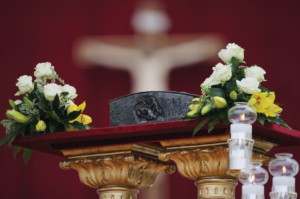
The relics of St. Peter the Apostle, pictured on the altar before Pope Francis celebrates Mass in St. Peter’s Square at the Vatican November 24 (Galazka photos).
Sunday 24 POPE CLOSES YEAR OF FAITH Pope Francis closed the Year of Faith by calling on people to keep Christ at the center of their lives, especially in times of trouble. The closing Mass in St. Peter’s Square also saw, for the first time, the exposition for public veneration of bones believed to be those of St. Peter. The apostle is believed to have been martyred on a hill overlooking St. Peter’s Square and buried in a tomb now located two levels below the main altar of St. Peter’s Basilica. Pope Francis began his homily by thanking retired Pope Benedict XVI for establishing the Year of Faith, calling it a “providential initiative” that gave Christians “the opportunity to rediscover the beauty of the journey of faith begun on the day of our baptism.” The Pope then greeted patriarchs and archbishops of the Eastern Catholic Churches, who were in Rome for a meeting, and extended those greetings to all Christians living in the Holy Land, Syria and the East, wishing “them the gift of peace and harmony.” In his homily, the Pope focused on “the centrality of Christ” and how the faithful are expected to recognize and accept “the centrality of Jesus Christ in our thoughts, words and works.” With an estimated 60,000 people gathered in the square for the Mass, a special collection was taken up for victims of Super Typhoon Haiyan in the Philippines. At the end of the Mass and before reciting the Angelus prayer at noon, the Pope formally presented his first apostolic exhortation to representatives of the Church community, including bishops, seminarians, catechists, Catholic journalists and a woman with a visual impairment, who received her copy as an audio file on a CD-ROM. The document on evangelization, titled Evangelii Gaudium (“The Joy of the Gospel”), was to be released to the public November 26.
POPE MARKS 80TH ANNIVERSARY OF “TERROR-FAMINE OF UKRAINE” At the end of his Angelus address, the Pope greeted the Ukrainian pilgrims remembering “the great famine provoked by the Soviet regime that caused millions of victims.” The next morning, Pope Francis joined the Ukrainian Catholic pilgrims from dozens of countries and told them that loving one another, loving the Church and working for Christian unity are the best ways to honor those who were martyred for their faith. During their pilgrimage, the Ukrainians, led by the head of their Church, Archbishop Sviatoslav Shevchuk of Kiev-Halych, marked the 80th anniversary of the “Holodomor” that killed millions of Ukrainians in 1932-33, and the 50th anniversary of the transfer of the relics of St. Josaphat to an altar in St. Peter’s Basilica. The Ukrainians celebrated a Divine Liturgy at the main altar of St. Peter’s Basilica before the Pope arrived and focused his remarks on St. Josaphat, who was martyred in 1623 for supporting the unity of his Byzantine-rite Church with Rome, and on the Ukrainian Catholics martyred under the Soviet regime for the same reason.
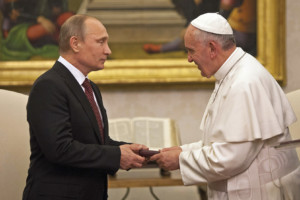
Pope Francis meets Vladimir Putin, President of the Russian Federation, in the private library at the Apostolic Palace on November 25 (Galazka photo).
Monday 25 POPE FRANCIS MEETS WITH RUSSIAN PRESIDENT Peace in the Middle East, particularly the ongoing war in Syria, topped the agenda November 25 as Pope Francis welcomed Russian President Vladimir Putin to the Vatican. The Russian president “conveyed the greetings of [Russian Orthodox] Patriarch Kirill, but there was not a discussion of ecumenical relations,” said Jesuit Father Federico Lombardi, Vatican spokesman. A formal statement issued after the meeting said “special attention was given to the pursuit of peace in the Middle East and to the serious situation in Syria.” Father Lombardi said the two also spoke about “the life of the Catholic community in Russia” and its contributions to the life of society, the oppression of Christians in some parts of the world, the defense and promotion of human dignity and the safeguarding of human life and the family. Pope Francis gave Putin a mosaic with a view of the Vatican Gardens, and Putin gave Pope Francis an icon of Our Lady of Vladimir, one of the most venerated images in the Russian Orthodox Church. Putin himself venerated the icon with a kiss, and Pope Francis followed suit.
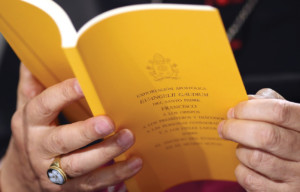
A copy of the apostolic exhortation Evangelii Gaudium (“The Joy of the Gospel”) by Pope Francis is seen during a news conference at the Vatican November 26 (CNS photo)
Tuesday 26 AN APOSTOLIC EXHORTATION BY POPE FRANCIS In his first extensive piece of writing as Pope, Pope Francis sets forth a vision of the Catholic Church dedicated to evangelization in a positive key, with a focus on society’s poorest and most vulnerable, including the aged and the unborn. Evangelii Gaudium (“The Joy of the Gospel”) is an apostolic exhortation, one of the most authoritative categories of papal document. The Pope wrote the new document in response to the October 2012 Synod of Bishops on the new evangelization, but declined to work from a draft provided by Synod officials.
DECEMBER Sunday 1 “BEST GIFT IN LIFE IS ENCOUNTERING CHRIST” A Christian’s whole life “is an encounter with Jesus: in prayer, when we go to Mass, when we do good works, when we visit the sick, when we help the poor, when we think of others, when we’re not self-centered, when we are amiable,” he said in a homily given at a Rome parish. Beginning Advent for the first time as Pope, Pope Francis visited the parish of San Cirillo Alessandrino in a neighborhood on the outskirts of Rome. Before celebrating Mass, he met with the sick, children who recently received their First Communion, and — accompanied by their parents — children baptized in the past year. He also heard confessions from a few parishioners and met with a group of young men he confirmed during the evening Mass. The evening before, Pope Francis continued the papal tradition of celebrating Vespers on the vigil of the first Sunday of Advent with students and professors from universities in Rome. “Don’t watch life go by from the balcony,” the Pope told young people, but be where the challenges of the modern day world are. “Whoever doesn’t respond to challenges is not living,” he said, pinpointing the problems of development, human dignity, poverty and life.
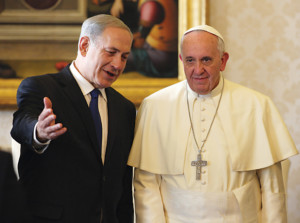
Pope Francis meets Benjamin Netanyahu, Israeli Prime Minister,in the private library at the Apostolxic Palace on December 2 (Galazka photo)
Monday 2 POPE MEETs WITH ISRAELI PRIME MINISTER Pope Francis met with Prime Minister Benjamin Netanyahu of Israel and discussed prospects for peace in the Middle East and the Pope’s still-unscheduled trip to the Holy Land. The two met privately for about 25 minutes in the Pope’s library. A statement from the Vatican press office said the leaders discussed the “complex political and social situation in the Middle East, with particular reference to the resumption of negotiations between the Israelis and the Palestinians, hoping that a just and lasting solution may be found as soon as possible.” The Pope’s plans for a trip to the Holy Land also came up, but the Vatican spokesman, Jesuit Father Federico Lombardi, told reporters no date had been set. After their private meeting, the prime minister presented the Pope with a book about the Spanish Inquisition’s persecution of the Jews. Netanyahu also gave Pope Francis a silver menorah, the nine-branched candelabrum used in celebrating the Jewish festival of Hanukkah, sitting on a silver tray with a little silver oil pitcher. The Pope gave Netanyahu a bronze plaque bearing an image of St. Paul.
Tuesday 3 MEETING of council of cardinals Pope Francis and the eight members of his international Council of Cardinals have begun their discussions on specific ways to reorganize the Roman Curia with the aim of “a renewal that will truly be a service to the universal Church,” the Vatican spokesman said. Jesuit Father Federico Lombardi, the spokesman, said the cardinals planned to discuss the work of each Congregation and, hopefully, each Pontifical Council. The Vatican spokesman continued to insist journalists and other observers should not expect changes to the Curia to be announced quickly because Pope Francis and the Council of Cardinals were committed to a complete overhaul of Vatican structures “in light of the expectations expressed by the College of Cardinals before the conclave” that elected Pope Francis in March. The council does not include the head of any Vatican Congregation or Council, Father Lombardi said. Officials of the Roman Curia have been able to respond to an invitation to send their ideas and questions to the council, he said. In addition, the spokesman said, “the Pope meets regularly and often with the heads of dicasteries (the Vatican offices), and these meetings go on for some time.” The next meeting of the council with the Pope is scheduled for February 17-18, Father Lombardi said. The meeting will be right before a likely gathering of the entire College of Cardinals with Pope Francis on the eve of the February 22 consistory at which Pope Francis plans to create new cardinals. The eight members of his council are: Cardinals Francisco Javier Errazuriz Ossa, retired archbishop of Santiago, Chile; Oswald Gracias of Mumbai, India; Reinhard Marx of Munich and Freising, Germany; Laurent Monsengwo Pasinya of Kinshasa, Congo; Sean P. O’Malley of Boston; George Pell of Sydney; Giuseppe Bertello, president of the commission governing Vatican City State; and Oscar Rodriguez Maradiaga of Tegucigalpa, Honduras.
Wednesday 4 PRAYERS FOR KIDNAPPED NUNS AND ALL PEOPLE ABDUCTED IN SYRIA “Let’s keep praying and working together for peace,” Pope Francis said in an appeal at the end of his weekly general audience in St. Peter’s Square. Pope Francis called on Catholics worldwide to pray for five Orthodox nuns who were kidnapped in Syria and for all people who have been abducted during the conflict there.
Thursday 5 POPE TO SET UP ADVISORY COMMISSION ON SEXUAL ABUSE Pope Francis accepted a proposal to set up a special commission on the sexual abuse of children, which will advise him on ways to prevent abuse and provide pastoral care for victims and their families. Cardinal Sean P. O’Malley of Boston, a member of the Pope’s advisory Council of Cardinals, announced the decision at a Vatican briefing for reporters December 5, during a break in the council’s meetings with the Pope. The cardinal said the new commission would continue the work of Pope Benedict XVI against clerical sex abuse, and that among its tasks would be to “study the present programs in place for the protection of children, and to come up with suggestions for new initiatives” by the Vatican, in collaboration with national bishops’ conferences and religious orders around the world. Cardinal O’Malley said the new sex abuse commission would be of international composition, consisting perhaps of 12 members, including lay people, members of religious orders and priests. The members will be persons with “competence in the safety of children, relations with victims, mental health, law enforcement” and other relevant subjects, he said.
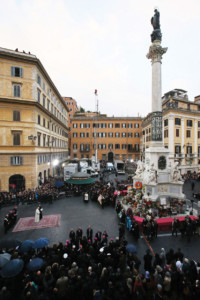
Pope Francis leads a Marian prayer service before the statue of Mary, near the Spanish Steps in Rome, on December 8, the feast of the Immaculate Conception (Galazka photo)
Sunday 8 FEAST OF THE IMMACULATE CONCEPTION Pope Francis prayed that people would never be indifferent to the cries of the poor, the suffering of the sick, the loneliness of the elderly and the fragility of children. “May every human life always be loved and venerated by all of us,” he prayed on the feast of the Immaculate Conception. Pope Francis marked the feast day with a traditional afternoon visit to a statue of Mary erected near the Spanish Steps. The visit was to pay homage to Mary by praying before the statue, which commemorates Pope Pius IX’s proclamation in 1854 that Mary, by special divine favor, was without sin from the moment she was conceived. The Pope offered a large basket of white roses trimmed with a white- and yellow-striped ribbon decorated with the Pope’s coat-of-arms. The basket was set among scores of other floral arrangements at the foot of the column topped by the statue. At the end of the prayers, Pope Francis kissed, hugged, greeted and blessed a long line of people in wheelchairs and their caregivers. He received a few individual white roses from people and a few notes and presents. After the ceremony, he stopped at Rome’s Basilica of St. Mary Major to pray before the basilica’s famous Marian icon Salus Populi Romani (“health of the Roman people”).



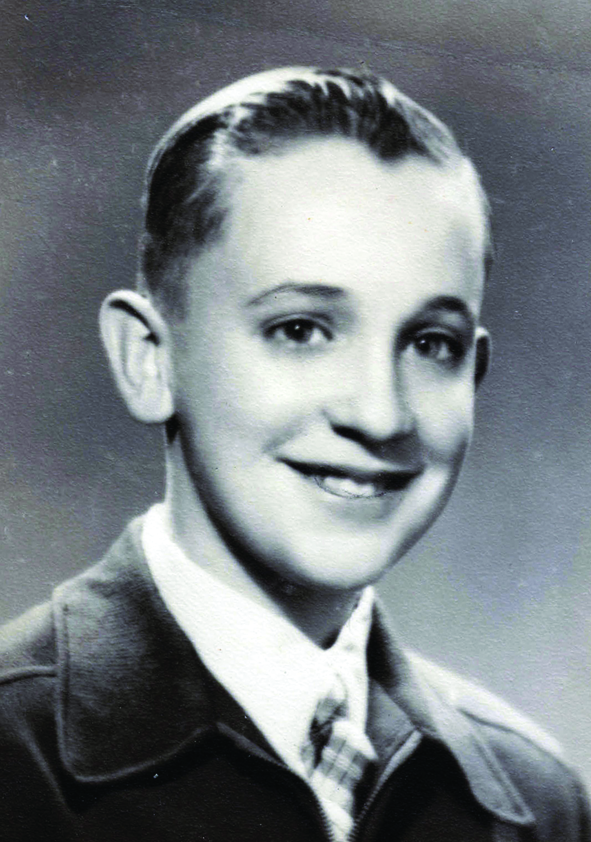


Facebook Comments